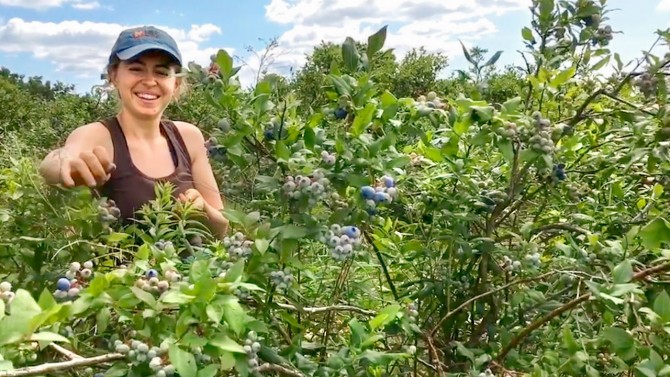
Talia Isaacson ’21 helps direct draft horses as they plow a field at Sterling College in Vermont, which Isaacson attended in 2017.
Summer practicum underway for first rural humanities cohort
By Kathy Hovis
Two undergraduates and six graduate students began studies and projects June 2 as part of the first summer practicum in the Rural Humanities scholarly initiative, a project funded for four years by a $1 million grant from The Andrew W. Mellon Foundation.
Students in the program will meet virtually each week to focus on questions of the rural as well as theories, methods and practices of public humanities and community-engaged scholarship. They are working with Ithaca-area partners to implement engaged projects focused on creating online archives of photos, texts, audio interviews, poetry, art and other materials.
“We’ve selected participants who have inspired us to think creatively,” said Shirley Samuels, professor of English, who will be teaching the six-week class with Anna Sims Bartel, an associate director of Cornell’s Office of Engagement Initiatives. “These students demonstrate commitments to rigorous humanistic scholarship that addresses issues of public concern and advances the understanding and well-being of our rural communities.”
The students have been awarded grants to cover their expenses for the summer, as well as to cover the costs of the projects, including contributions to community partners.
Participants have expressed strong interests in thinking about and actively engaging with rural communities and landscapes.
“My interests circulate around how food systems can intersect with the welfare of communities and the environment. So studying English has been my way to approach food systems from a humanities lens,” said Talia Isaacson ’21. “I think Cornell drew me in because it embodies a lot of the agrarian philosophy that I’m interested in. It’s a land-grant university but it draws connections between what are usually the disparate worlds of agriculture and the humanities.”
This spring, Isaacson took the rural humanities seminar, a mix of theory and practice where students started developing community projects. Isaacson formed the basis of her online agrarian library idea during the spring, but its scope has expanded.
She is creating a digital repository that will host a large variety of publicly available books, guides and documents that fall under the umbrella of agrarianism.
“It will look backward to catalog the past, but also question the canonical idea of what it means for something to be agrarian and explore whose stories have been left out of the classic canon of American agrarian thoughts,” she said. “A large theme I’ve picked up is that agrarian literature largely relies on a sort of implicit land ownership. It doesn’t generally include the stories of those whose labor is being exploited, so scholars are trying to confront that oversight.”
During their weekly meetings, students will present their projects to each other, think about possible future collaborations, and support each other as they explain challenges, Bartel said.
“We anticipate there might be possible design projects for summer 2021 and beyond,” Bartel said, “such as a map or other articulation of key partners in rural areas or a website/wiki exploring this concept of rural humanities and opening the dialogue more broadly.”
A version of this story can be found on the Arts and Sciences website.
Kathy Hovis is a writer for the college of Arts and Sciences.
Media Contact
Get Cornell news delivered right to your inbox.
Subscribe

